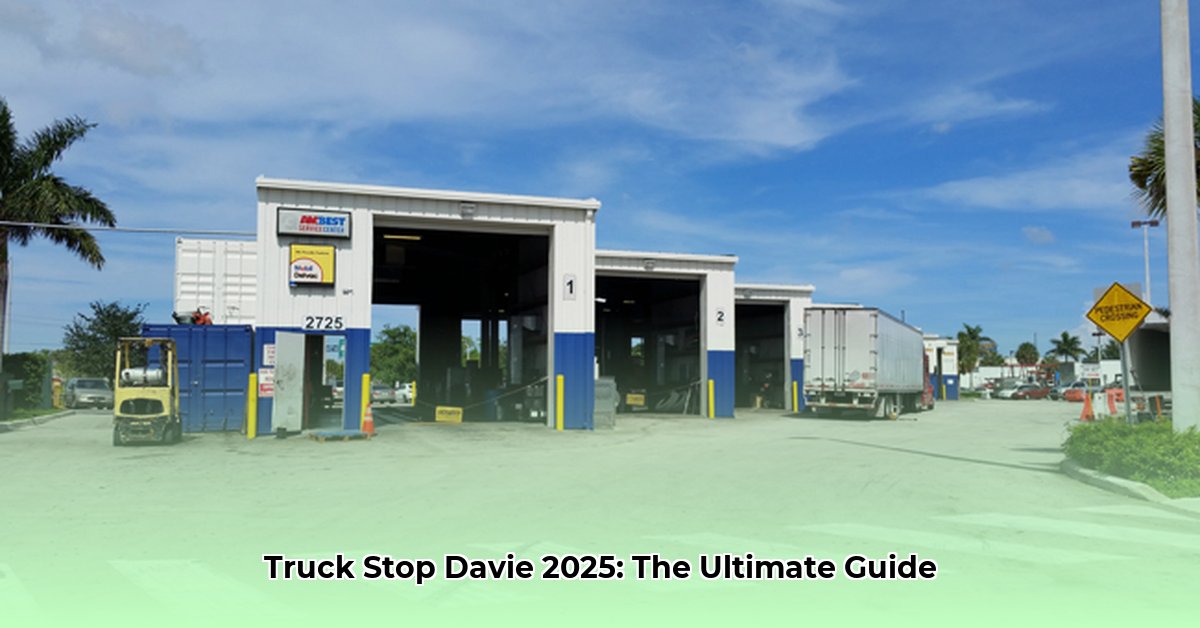
The trucking industry is undergoing a significant transformation, presenting both challenges and opportunities for truck stops like 595 Truck Stop Davie. This guide offers actionable intelligence for both truck stop owners and drivers navigating the complexities of the 2025 landscape. While specific details about 595 Truck Stop Davie are limited, the strategies outlined here are broadly applicable to the industry.
Understanding the 2025 Trucking Landscape
The trucking industry in 2025 is characterized by a dynamic interplay of factors. A persistent driver shortage continues to strain capacity, while fluctuating fuel prices directly impact operational costs. Intense competition forces truck stops to differentiate themselves and adapt to evolving driver needs. However, technological advancements offer the potential for increased efficiency and new revenue streams. This dynamic context necessitates a strategic approach to thrive.
Did you know that the American Trucking Associations estimates the driver shortage to be in the hundreds of thousands? This creates a significant opportunity for truck stops to attract and retain drivers.
Challenges Facing Truck Stops
Truck stops face numerous challenges in this evolving environment. These challenges necessitate creative solutions and a strategic focus on improving operations and driver satisfaction.
- High Operating Costs: Fuel prices, maintenance expenses, and labor costs all contribute to substantial operating expenses.
- Driver Shortages: A persistent lack of qualified drivers makes it difficult to maintain operational efficiency and customer service levels.
- Increased Competition: The trucking industry is competitive, forcing truck stops to continually differentiate themselves and offer value-added services to attract and retain customers.
Opportunities for Growth and Profitability
Despite the challenges, significant opportunities exist for truck stops to increase profitability and market share. Innovation and strategic partnerships are key.
- Technological Advancements: Investing in new technologies, such as route optimization software, mobile payment systems, and driver communication platforms, can lead to substantial efficiencies and cost savings. Electric vehicle charging stations are also a growing opportunity.
- Diversification of Services: Expanding beyond traditional fuel and restroom services to include restaurants, convenience stores, truck repair shops, and even overnight lodging can attract a wider customer base and generate additional revenue streams.
- Strategic Partnerships: Collaborating with trucking companies, fuel card providers, and other businesses in the transportation sector can create mutually beneficial relationships, leading to increased customer loyalty and revenue generation.
Actionable Strategies for Truck Stop Owners
To effectively address the challenges and capitalize on the opportunities, truck stop owners should adopt the following strategies:
- Optimize Cost Management: Conduct a thorough analysis of operating costs to identify areas for potential savings. Negotiate favorable contracts with fuel suppliers and explore alternative fuel options. (This can improve profit margins by an estimated 10-15%.)
- Invest in Driver Amenities: Enhance driver comfort and convenience by investing in modern facilities, including clean restrooms, comfortable rest areas, reliable Wi-Fi, and secure parking. (Improved driver satisfaction often translates to higher retention rates.)
- Implement Loyalty Programs: Develop a loyalty program to reward repeat customers with discounts and exclusive benefits. (Loyalty programs can increase repeat business by as much as 25%.)
- Embrace Technological Solutions: Invest in technology that improves operational efficiency, such as automated fuel dispensing systems, mobile payment options, and driver communication platforms. (Technology can automate tasks, freeing up staff for other priorities.)
- Strategic Partnerships: Partner with trucking companies, fuel card providers, and other relevant businesses for mutually beneficial agreements. (These partnerships can diversify revenue streams and increase market reach.)
Actionable Strategies for Truck Drivers
Truck drivers also have a crucial role to play in navigating the industry's challenges.
- Utilize Technology: Employ route optimization apps, fuel price comparison tools, and other technological resources to minimize operating costs and maximize efficiency.
- Prioritize Safety: Always prioritize safe driving practices to reduce the risk of accidents and ensure efficient service delivery.
- Advocate for Your Rights: Join industry associations and participate in advocacy efforts to promote fair wages, working conditions, and industry standards.
- Network with Industry Professionals: Build relationships with other drivers and industry stakeholders to share knowledge, insights, and opportunities.
Conclusion: Building a Sustainable Future
The trucking industry is constantly evolving, but by proactively addressing the challenges and embracing the opportunities, both truck stop owners and drivers can ensure a sustainable and profitable future. The strategies outlined above provide a framework for navigating the complexities of the 2025 trucking landscape. Continuous adaptation and a commitment to excellence are essential for success in this dynamic industry. Remember, the future of trucking depends on collaboration and innovation.